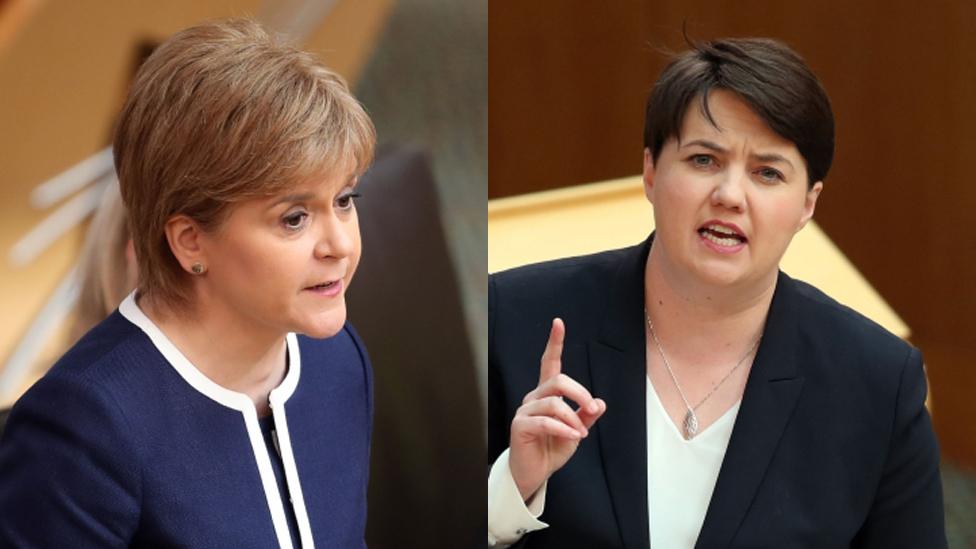FMQs: pre-election manoeuvring at Holyrood
- Published
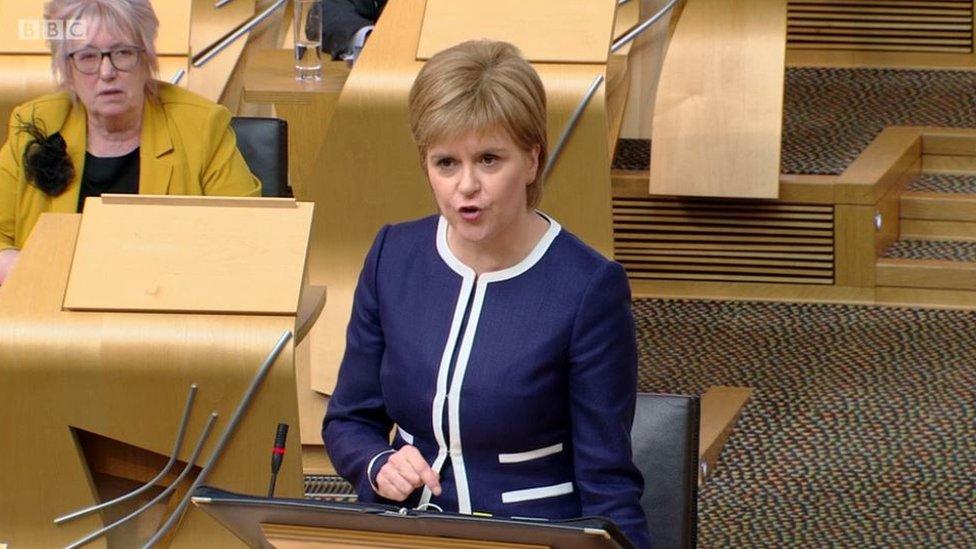
Nicola Sturgeon took questions at Holyrood for the first time since the snap election was announced
Elections tend to develop their own tone, their own leitmotif. Thus far, this UK general election is largely about strategy.
Rather than a contest over a particular policy or policies, it is about manoeuvring to gain tactical advantage.
That is perhaps implicit in the principal motivation for calling an election now - which is to give the incumbent government an opportunity to take advantage of the perceived weakness of the official opposition at Westminster.
That tactical leitmotif recurred in the chorus of contradictory comments which comprised weekly questions to the first minister at Holyrood today.
Yes, there were issues of substance. But those were generally subsumed within the arguments over political machination. Who would ally with whom? Who would disdain whom?
I suspect I am not alone in finding the exchanges less than elevating. Indeed, my preferred description might rather be enervating.
However, we are where we are. An election is under way. And so, entirely understandably, everything is viewed through the prism of that contest.
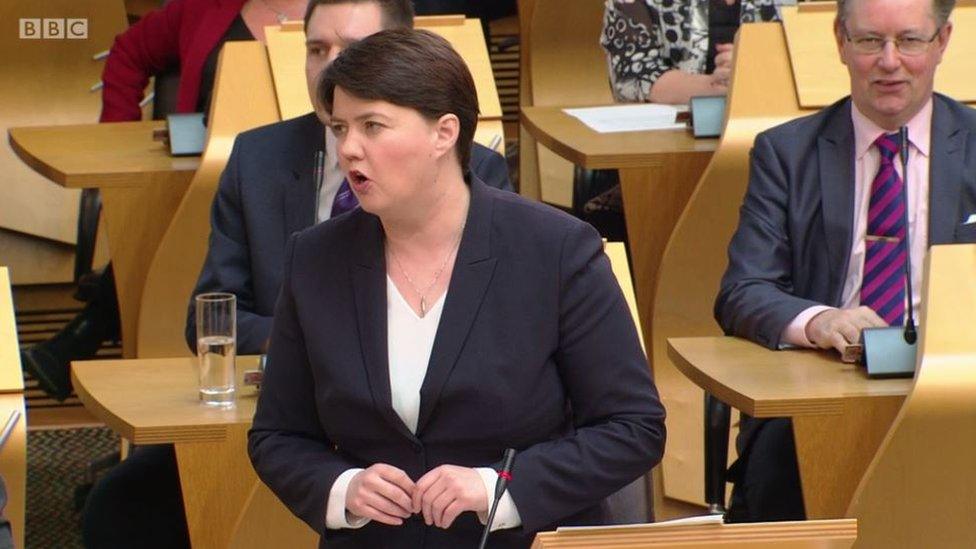
Ruth Davidson sought to tie Ms Sturgeon to Labour leader Jeremy Corbyn
Nicola Sturgeon heaped contumely upon Ruth Davidson for the latter's refusal to condemn the so-called rape clause: the UK Conservative statute which requires women to declare they have been raped if they wish to claim tax credit for a third child, the statutory limit being two.
But, again entirely understandably, the argument moved relatively swiftly into a strategic consideration. What, inquired the First Minister, would the Tories do, unchecked, with a larger majority at Westminster?
Some might say that begs the question as to what the existing SNP contingent has contrived to do at Westminster to constrain the Conservatives. But Ms Sturgeon's point was about relative power and its exercise.
Progressive alliance?
She characterised the Labour Party as "useless" and its leader, Jeremy Corbyn, as a definite loser. Which begs another question. Why did she suggest yesterday in Westminster that she might contemplate a "progressive alliance", including Labour, if the numbers stacked up?
I think that reply was perhaps slightly off message. Certainly, such a strategy has not featured in the published statements by the FM which have concentrated upon countering what she characterised as the austerity and hard Brexit approach of the Tories.
And, even more certainly, it did not feature in the FM's comments today. Jeremy Corbyn, she said bluntly, would not be entering Downing Street, with or without external help.
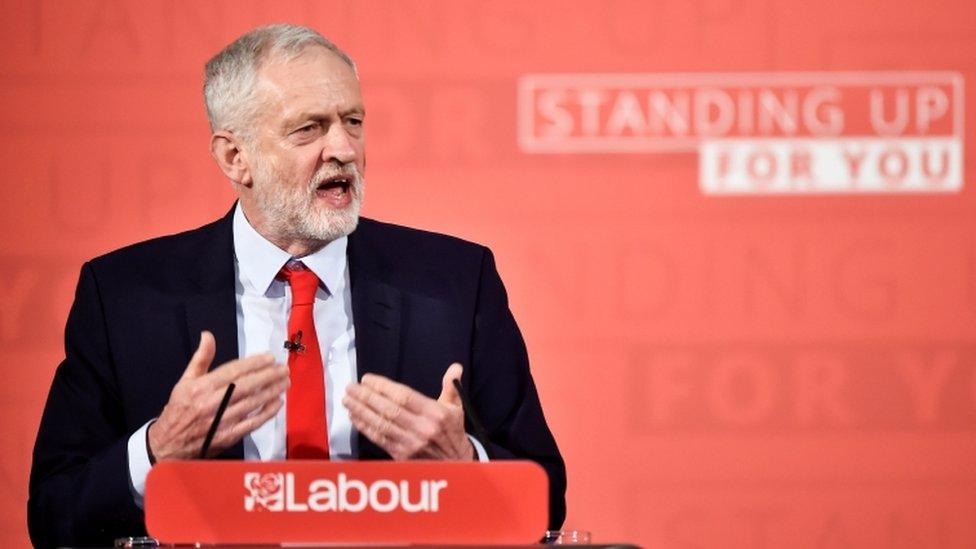
Ms Sturgeon wrote off Mr Corbyn's chances of getting anywhere near Downing Street
What was required was a strong Scottish contingent to contain the Tories. It will not astonish you to learn the political colour of that proposed cadre. In essence, it is an amended version of the strategy deployed by Ruth Davidson at the Holyrood elections last year when she posited herself as leading a strong opposition.
As for Ms Davidson today, she too was in tactical mood. She accused Ms Sturgeon of seeking to propel Jeremy Corbyn into Downing Street. For the first ministerial reply, see above.
Tactics too in the exchanges with Labour's Kezia Dugdale. Ms Dugdale said the SNP wanted a Tory UK victory because it might drive Scots towards support for independence.
In response, Ms Sturgeon reminded the Scottish Labour leader that she had been less than complimentary about Mr Corbyn in the past. The FM also noted, with dry wit on hand, that it was scarcely her fault that Labour was seemingly in decline.
Soft on Europe?
For the Liberal Democrats, Willie Rennie wanted early sight of the SNP manifesto. He suspected it might not feature absolute, unconditional support for the European Union. He knew, he said, what Team Sturgeon were up to. They were appealing to Brexiteers by "going soft" on Europe.
Now, there has been some manoeuvring by the SNP over this question, largely predicated upon the prospect that, by the time of the next Holyrood election, the UK (including Scotland) might be out of the EU.
The talk was of working back steadily towards the EU perhaps through the conduit of the European Economic Area.
But such does not comparably apply to a UK election held seven weeks hence. Britain (including Scotland) is, for now, still in the EU. Any necessary sophistry can presumably be deferred.
So, yes, Nicola Sturgeon engendered some bogus oohs and aahs today when she noted that she accorded priority to the European single market. But she also repeated, staccato style, her mantra that she supports membership of the European Union.
And the manifesto? Patience.
- Published20 April 2017
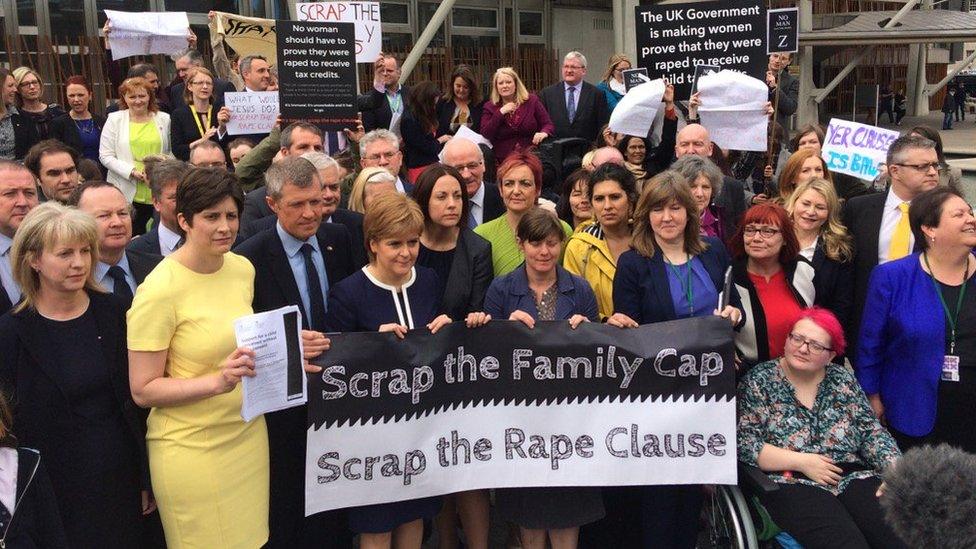
- Published20 April 2017
